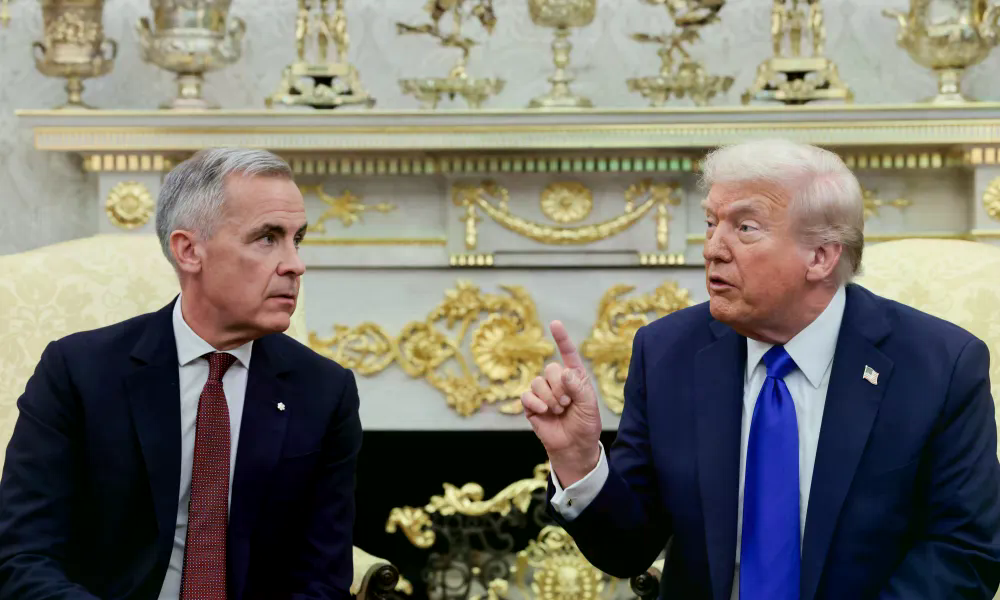
Tensions between the United States and Canada have escalated following an advertisement released by Ontario, Canada’s largest province, featuring former U.S. President Ronald Reagan. The ad, which highlights Reagan’s criticism of tariffs as an economic policy, has sparked controversy and renewed friction between Washington and Ottawa, which has already been strained by President Donald Trump’s tariff policies.
In a post on Truth Social on Thursday night, Trump accused the advertisement of being “fake,” citing statements from the Ronald Reagan Presidential Foundation that described the clip used in the commercial as doctored. However, the content of the ad aligns with Reagan’s known views on trade. Trump also claimed the advertisement was intended to influence U.S. courts, and he declared, “Based on their egregious behavior, ALL TRADE NEGOTIATIONS WITH CANADA ARE HEREBY TERMINATED.”
Ontario Premier Doug Ford responded by announcing a pause in the advertising campaign to allow for ongoing trade discussions between the two countries. He stated that the goal of the ad was to spark a dialogue about the economy and the impact of tariffs on workers and businesses. “We’ve achieved our goal, having reached US audiences at the highest levels,” Ford said.
The advertisement, launched on October 16, features Reagan’s remarks from a 1987 speech on free and fair trade. In the speech, Reagan acknowledged the short-term benefits of tariffs but warned of long-term consequences, including retaliation from other countries, shrinking markets, and job losses. The ad uses visuals of the New York Stock Exchange, farm fields, and cranes, accompanied by Reagan’s voice, to emphasize its message.
According to Canadian media reports, Ford is a self-proclaimed fan of Reagan and his office stated that the ad would be shown on major U.S. platforms like Bloomberg and Fox News. The campaign aimed to target Republican voters who might recognize the impact of tariffs through Reagan’s voice.
However, the Ronald Reagan Presidential Foundation & Institute criticized the ad, claiming it misrepresented Reagan’s original address and had not received permission for editing. While the ad includes Reagan’s exact words, they are presented out of sequence. For example, Reagan’s warning about long-term harm from tariffs appears earlier in the ad than in the original speech, and some phrases were rearranged to strengthen the argument.
Despite these edits, the overall message of the ad aligns with Reagan’s stance against excessive tariffs. Some Canadian officials, including former Conservative cabinet minister Jason Kenney, defended the ad, arguing that it accurately reflected Reagan’s opposition to tariffs and support for free trade.
Trump further accused Canada of attempting to interfere with U.S. judicial decisions, particularly as the Supreme Court prepares to rule on the legality of his tariff regime. His administration has imposed significant tariffs on Canadian goods, citing concerns over trade deficits and fentanyl trafficking, though Canadian officials have disputed the latter claim.
The dispute over tariffs has been part of a broader pattern of tension between the two nations. In June, Trump threatened to terminate all trade negotiations with Canada after it introduced a Digital Services Tax (DST) on U.S. firms. Canada later rescinded the tax to ease trade tensions.
Canada remains one of the U.S.’s top trading partners, with over 77% of its exports going to the U.S. The steel and aluminum sectors have been particularly affected by U.S. tariffs. Despite efforts to negotiate a trade deal, recent developments suggest that progress may be difficult to achieve.
Canadian Prime Minister Justin Trudeau emphasized that while Canada is willing to resume trade talks, it cannot control U.S. trade policy. “We can’t control the trade policy of the United States. We recognize that that policy has fundamentally changed from the 1980s,” he said.
Ian Lesser, a senior fellow at the German Marshall Fund, noted that the current U.S.-Canada relationship is marked by unprecedented friction, driven not only by policy differences but also by the personal style of U.S. leadership. Public opinion in Canada has turned increasingly negative toward the U.S., creating a climate where domestic politics heavily influences the bilateral relationship.
As both nations navigate these challenges, the future of their trade relations remains uncertain, with the outcome of the Supreme Court’s ruling on Trump’s tariffs playing a critical role in shaping the path forward.


